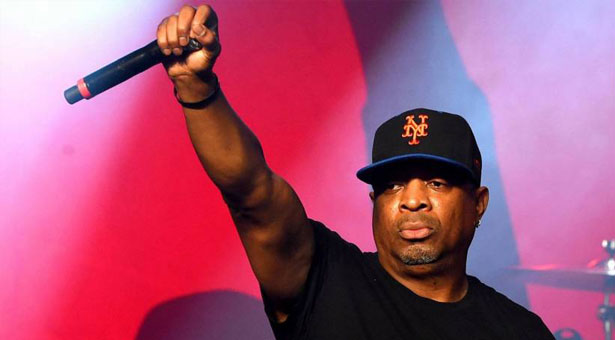
Stacy M. Brown NNPA Newswire Senior National Correspondent
As family, friends, and fans, continue to mourn the death of Migos member Takeoff, the demand for hip-hop to take a stand against gun violence has grown.
While many have expressed disbelief and anger that the shooting death of the 28-year-old, whose real name is Kirshnik Khari Ball, took place allegedly because of an argument over a dice game.
Fans on social media and the mainstream press have quickly tossed blame at everyone from Takeoff’s bandmate Quavo to clothing boss J. Prince Jr. and even to the slain rap star himself.
And as always, hip-hop has come under fire.
That’s no surprise to legendary Public Enemy frontman Chuck D, whom most recognize as hip-hop’s voice of reason.
In putting in a perspective as perhaps only the “Fight the Power” artist can, Chuck noted that any other industry that has seen as many fatalities as hip-hop would have addressed that issue long ago.
And Chuck doesn’t put the blame entirely on the artists.
“This curiosity of what is this hip-hop thing, what is this Black thing. The world always seems to want to know and mimic our greatness,” Chuck asserted in a 30-minute interview with the Black Press of America’s live morning news program, “Let It Be Known.
“And if they can find a way to finance and have our people mimic us at our worst – the stereotype that generalizes us as a bunch of murderous thugs and metastasize that over a 10-15-20-year period as being normal, then we got a problem.”
He continued:
“I don’t blame the youth. You’ve got to blame some adults hiding behind the scenes, pied piping and pied papering all of this madness and making this kind of thing seem normal. Was there a shootout at a dice game? Yes. Were Black men involved in that circle? Yes. But it’s somebody pushing buttons and pulling levers and not only doing so but they have been greatly enriched financially by these incidents.”
Takeoff’s death counts among a string of murders in the hip-hop community over the past several years.
Other high-profile murders include PnB Rock, Pop Smoke, XXXTentacion, Nipsey Hustle, King Von, and Young Dolph.
“I was in college when Biggie and ‘Pac was killed and thought there was no way we’d ever experience anything remotely close to that again,” media personality Jemele Hill tweeted following Takeoff’s death.
“Now,” Hill continued. “It’s happening so frequently that you barely have time to recover before someone else is killed.”
Chuck noted that a large part of the argument about hip-hop deaths and violence comes from many who don’t consider all available facts.
“There are hundreds of thousands of artists out there,” he said when asked whether the younger artists pay attention to the old heads.
“Who do you count? Do you count the more successful ones because more people like them? When we start getting into followers and likes, those algorithms don’t add up to who we are as a people,” Chuck insisted.
He explained:
“I have ten stations on Rap Station (Radio). We play artists from the underground and under-found. We play artists with a 10-15-year career, women worldwide and in more abundance than in the United States.”
Chuck continued:
“If you only pay attention to what’s being washed up on your shores, you’re going to get a limited view of what it really is. There is really no kind of educational forum that people can go to like in other aspects of life. Our arts and culture should be taught to us. If we don’t control our educational curriculum, we’re going to let corporations teach us. And, whenever corporations show up, God walks out the door.”
In a recent podcast, Takeoff spoke about receiving his flowers before he died.
“It’s time to pop it,” Takeoff said on “Drink Champs.”
“It’s time to give me my flowers. I don’t want them later when I’m not here. I want them right now.”
Chuck said the life artists today lead, compared to earlier hip-hop stars, is different.
“At the beginning of hip-hop, especially in the real beginning, cats wanted to get away from that,”
Chuck recounted.
“They didn’t want to be in the Bronx. New York City had been deemphasized and abandoned by the U.S.A. during a tough fiscal time post-Nixon. Cats saw the emergence of hard drugs coming in out of nowhere. Guns coming out of nowhere, and cats wanted to get away from that, and they didn’t want to [rhyme] about that in the 1980s.
He concluded:
“You had MCs and rappers who adhered to those values and qualities. We could have “The Message” by Grandmaster Flash and the Furious Five that talked about what’s going on, but they also made party records to not talk about things people saw every day.
“There was a balance to at least try to bring good times into the picture. People often said Public Enemy bought a political message, but we came from the 1960s, so we remember a time of being broke but not broken.
“Many cats came from the 1970s doing hip hop in the 1980s and 1990s.
“We came from the Black Panther Party doing lunch programs, the Nation of Islam doing things in the neighborhood. We remember Dr. Martin Luther King and Malcolm X being assassinated when they were living people to us.
“On my birth certificate, it says ‘Negro.’ I remember being ‘Colored’ and ‘Black is Beautiful.’ That’s a different period that has been kind of pushed under the rug in Americana.”
Recommended For You.



Be the first to comment